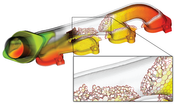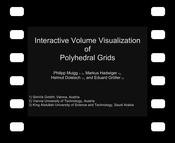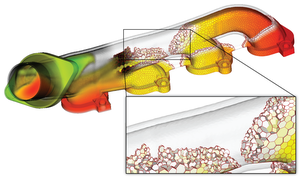Information
- Publication Type: Journal Paper with Conference Talk
- Workgroup(s)/Project(s): not specified
- Date: December 2011
- Journal: IEEE Transaction on Visualization and Computer Graphics
- Volume: 17
- Number: 12
- Location: Providence, RI, USA
- Lecturer: Philipp Muigg
- ISSN: 1077 - 2626
- Event: IEEE VisWeek 2011
- Conference date: 23. October 2011 – 28. October 2011
- Pages: 2115 – 2124
Abstract
This paper presents a novel framework for visualizing volumetric data specified on complex polyhedral grids, without the need to perform any kind of a priori tetrahedralization. These grids are composed of polyhedra that often are non-convex and have an arbitrary number of faces, where the faces can be non-planar with an arbitrary number of vertices. The importance of such grids in state-of-the-art simulation packages is increasing rapidly. We propose a very compact, face-based data structure for representing such meshes for visualization, called two-sided face sequence lists (TSFSL), as well as an algorithm for direct GPU-based ray-casting using this representation. The TSFSL data structure is able to represent the entire mesh topology in a 1D TSFSL data array of face records, which facilitates the use of efficient 1D texture accesses for visualization. In order to scale to large data sizes, we employ a mesh decomposition into bricks that can be handled independently, where each brick is then composed of its own TSFSL array. This bricking enables memory savings and performance improvements for large meshes. We illustrate the feasibility of our approach with real-world application results, by visualizing highly complex polyhedral data from commercial state-of-the-art simulation packages.Additional Files and Images
Additional images and videos
 image:
This exhaust manifold data set is defined on a polyhedral grid. The zoom-in shows the underlying mesh structure
image:
This exhaust manifold data set is defined on a polyhedral grid. The zoom-in shows the underlying mesh structure
 video:
video demonstration
video:
video demonstration
Additional files
Weblinks
No further information available.BibTeX
@article{muigg-2011-gpg,
title = "Interactive Volume Visualization of General Polyhedral Grids",
author = "Philipp Muigg and Markus Hadwiger and Helmut Doleisch and
Eduard Gr\"{o}ller",
year = "2011",
abstract = "This paper presents a novel framework for visualizing
volumetric data specified on complex polyhedral grids,
without the need to perform any kind of a priori
tetrahedralization. These grids are composed of polyhedra
that often are non-convex and have an arbitrary number of
faces, where the faces can be non-planar with an arbitrary
number of vertices. The importance of such grids in
state-of-the-art simulation packages is increasing rapidly.
We propose a very compact, face-based data structure for
representing such meshes for visualization, called two-sided
face sequence lists (TSFSL), as well as an algorithm for
direct GPU-based ray-casting using this representation. The
TSFSL data structure is able to represent the entire mesh
topology in a 1D TSFSL data array of face records, which
facilitates the use of efficient 1D texture accesses for
visualization. In order to scale to large data sizes, we
employ a mesh decomposition into bricks that can be handled
independently, where each brick is then composed of its own
TSFSL array. This bricking enables memory savings and
performance improvements for large meshes. We illustrate the
feasibility of our approach with real-world application
results, by visualizing highly complex polyhedral data from
commercial state-of-the-art simulation packages.",
month = dec,
journal = "IEEE Transaction on Visualization and Computer Graphics",
volume = "17",
number = "12",
issn = "1077 - 2626",
pages = "2115--2124",
URL = "https://www.cg.tuwien.ac.at/research/publications/2011/muigg-2011-gpg/",
}


